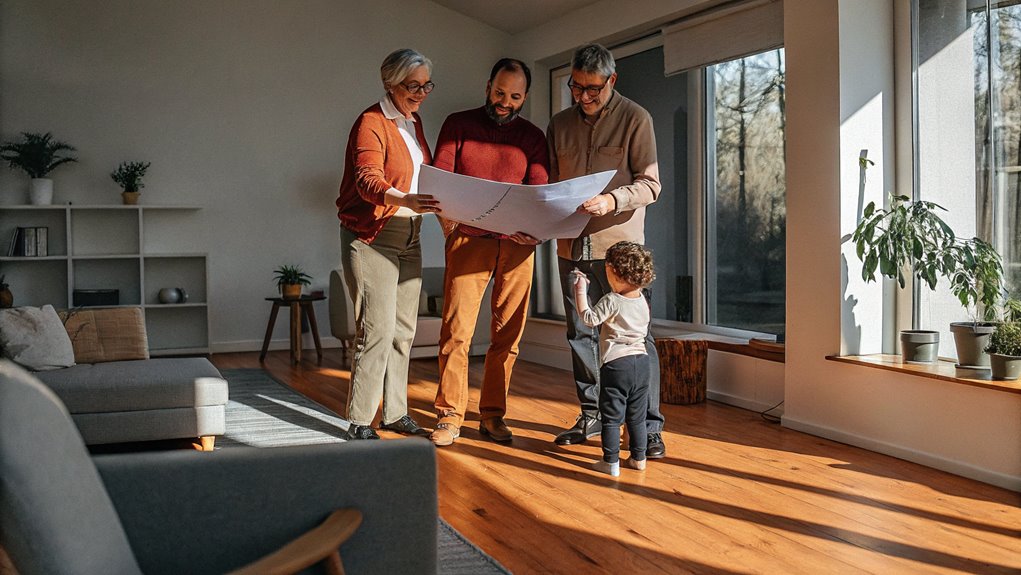Having a home is like having a special piggy bank that grows bigger over time. When you own a home, you can save much more money than people who rent. Each time you pay your monthly house payment, you own a little more of your home. The value of your house usually goes up each year too. You can use your home to make even more money, like taking out loans to start a business. The best part is that after many years, your home could be worth three or four times what you paid for it. This means you can help your kids and their kids have a better life by leaving them your home. Smart homeowners know this and plan to keep their homes for a long time.
Understanding Home Equity Growth

Your home can help you build money over time. Think of it like a piggy bank that grows bigger in two ways.
First, each time you pay your mortgage, you own more of your home.
Second, your home may become worth more money as time passes.
Over the past 30 years, homes in the U.S. have grown in value by about 3-4% each year.
You can help your home's value grow faster by:
- Paying extra on your mortgage
- Making your home nicer
- Buying in good neighborhoods
As you own more of your home, you can borrow money against it. This can help you pay for things like school or other ways to make more money.
Tax Benefits of Homeownership
Owning a home helps you save money on taxes. When you own a home, you can pay less in taxes each year. This happens in a few simple ways.
You can save money on:
- The interest you pay on your home loan
- The taxes you pay on your house
- Some of the costs to make your home use less energy
Let's look at what you can save:
| What You Save On | How Much You Save | What You Need |
|---|---|---|
| Loan Interest | Up to $750k off | Must list all tax saves |
| House Taxes | Up to $10k off | Depends on your state |
| Energy Saves | Up to $3,200 per year | Must be approved fixes |
| Home Sale Profit | Up to $500k off | Must live there 2 years |
To save the most money, keep all your papers and bills in a safe place. Talk to someone who knows about taxes. They can help make sure you get all the money you can save.
These tax saves mean more money stays in your wallet. Over time, this helps you save more money and grow your wealth.
Leveraging Property for Investment

Your house can do more than give you a place to live. As you pay down your mortgage, you build up money in your home. This money is like a piggy bank you can use.
You can ask the bank for loans using your house as backup. These loans cost less than credit cards. Many people use this money to buy more houses or start small businesses.
You can also get cash from your house by doing something called a refinance. This lets you take out the money you've saved up in your home.
Most rich people started by using their first home to make more money. In fact, people who own homes end up with 40 times more money than people who rent. This is because they can use their homes to make more money grow.
Think of your home like a tool that helps you make more money over time. You can use it to start new ways to earn money and grow your savings.
Real Estate Market Appreciation
Your house can grow in value over time, like a plant growing taller. This means you make money just by owning your home. Most homes go up in value by about 4% each year. You don't need to do much – just take care of your home and pay your bills.
Where you buy your home is very important. Homes near good schools and lots of jobs often go up in value faster. You can pick a spot where new stores or roads are being built. This can help your home be worth more money later.
When you pick a good spot, your home can make money that helps your kids and family in the future.
Building Credit Through Mortgage Payments

Your home loan payments can help make your credit better. Just like getting good grades in school, paying your home loan on time helps you get a good credit score. When you pay each month, the bank tells three big companies that you did a good job.
If you pay on time all the time, it's like getting gold stars. These gold stars (your good payments) stay on your record for many years. This helps you save money later when you want to borrow more money or get a credit card.
Many people who pay their home loans on time end up with very good credit scores.
To make sure you never miss a payment, let the bank take the money from your bank account each month. Also, keep extra money in your account just in case.
Home Improvement Value Strategies
Your home is worth more when you make smart changes to it. When you fix up your home the right way, you can get back most of what you spend.
Let's look at what you can do to make your home better.
Make your kitchen look new. Put in new tools to cook with and strong counter tops. This can make your home worth more money.
Save money on your power bills. Get new windows and add better wall padding. This helps you pay less each month to heat and cool your home.
Add a new bathroom. More bathrooms make your home worth more money. This works best if you only have one bathroom now.
Get a new roof. A good roof keeps your home safe and dry. Most people get back much of what they spend on a new roof when they sell their home.
Make the front of your home look nice. Plant trees and flowers. When your home looks good from the street, it's worth more money.
Rental Income Potential

Turning your home into a rental can put extra money in your pocket each month. Your renters will pay you, and that money helps cover your costs like the mortgage, taxes, and fixes.
You might make between $200 to $800 each month after paying all the bills. Over time, rental homes often grow in value by 3-5% each year.
This means you can make money two ways – from your monthly rent checks and from your home being worth more as time goes by.
Monthly Cash Flow Benefits
Owning a home lets you make extra money each month by renting it out. You can rent your whole house or just a room. This gives you money in your pocket while you own the home.
When you rent out your home:
- You get rent money that can be more than your house payment
- Your renters help pay for house costs like taxes and fixes
- You pay less in taxes because you can write off rental costs
- You can make money from different parts of your house
- You can start with one home and grow to own more
Rental Property Value Growth
As you own rental homes, two good things happen.
First, your homes usually become worth more money over time.
Second, the rent money from your tenants helps pay off your loans.
Let's look at how home values went up:
In 2000, homes cost $207,000 and made $1,100 each month.
In 2005, homes cost $275,000 and made $1,450 each month.
In 2010, homes cost $320,000 and made $1,800 each month.
In 2015, homes cost $389,000 and made $2,200 each month.
In 2020, homes cost $485,000 and made $2,800 each month.
When you buy more than one home, you can make more money.
Having homes in different places is smart.
It keeps your money safer and helps you save more for your family's future.
Property as Inheritance Asset
Your house is a special gift you can give to your family when you're gone.
Just like a tree grows taller each year, your house grows in value over time. This means your kids and grandkids will get more than what you paid for it.
It's easy to make sure your house goes to your loved ones. You can set up simple papers that say who gets your house. This way, your family won't have a hard time getting the house later.
The good news is that when your family gets your house, they won't have to pay much in taxes.
The law helps them save money when they get this gift from you.
Long-Term Value Growth
Buying a home can help you grow your money over many years. Think of it like planting a tree – it gets bigger and more valuable as time goes by. Most homes go up in price faster than things at the store get more expensive. This means your home can protect your money and help make your family richer.
When you buy a home:
- Its price usually goes up each year
- You can make it worth more by fixing it up
- Picking a good spot helps it grow in value faster
- Paying your home loan builds up your wealth
- If you keep your home for 30 years, you could get back 3 or 4 times what you paid
The best part is that you can live in your investment while it grows. Each time you pay your home loan, you own more of your house.
Plus, when you make your home nicer or when your area gets better, your house becomes worth even more money.
Clear Family Transfer Process
When you own a home, you can help your family grow richer over time. Giving your home to your kids is easy. The law makes it simple to pass down your house.
You can use a living trust to help your kids get your home faster when you die. This saves them money and time. Instead of waiting many months, they can get the house in a few weeks. They also won't have to pay extra taxes on how much the house grew in value while you owned it.
Talk to a lawyer who knows about family money plans. They can help you pick the best way to give your home to your kids later.
Tax-Efficient Wealth Transfer
When you want to pass your home to your kids, you can save them money with smart tax moves.
Think of it like this – the day they get your home, its value gets a fresh start. This means they won't have to pay as much in taxes later.
Right now, you can give away up to $12.92 million without paying any big taxes. This helps your kids keep more of what you leave them.
You have many ways to help your kids pay less tax:
- Put your home in a special trust
- Own the home with your spouse
- Give small parts of your home each year ($17,000 worth)
- Use a trust that works while you're alive
These simple steps can save your kids money and keep your plans private.
They won't have to deal with as many courts or papers later.
Mortgage Vs Rent Analysis

Buying a home or renting are both ways to have a place to live. Let's look at what each one means for your money.
When you rent, your monthly payments go to your landlord. But when you buy a home, each payment helps you own more of your house.
To pick the best choice, look at how much homes cost to buy and rent in your area. Add up all the costs of buying:
- Monthly home payment
- Property taxes
- Home insurance
- Home repairs
For repairs, save about $1-2 for every $100 your house is worth each year.
The good thing about buying is your payment stays the same. Rent goes up about $3-5 for every $100 you pay each year.
After 15-30 years of payments, you'll own your home. Then you can:
- Give it to your kids
- Sell it
- Use it to make more money
Home Equity Lines Benefits
Your home loan is like having a special piggy bank built into your house. When you need money, you can borrow from your home at a lower cost than credit cards. This means you pay less each month in fees.
You can use this money for fixing up your house, going to school, or paying off other bills. The best part is you pick how much money you want to use and when you want to use it.
This is a smart way to get money when you need it, and it costs less than other types of loans.
Flexible Access to Cash
Your Home Can Help You Get Money When You Need It
A home equity line of credit (HELOC) lets you use the value in your home like a big piggy bank. Think of it as a credit card that uses your house to get better rates. You only pay for what you use, which saves you money.
You can use this money for:
- Making your home better and worth more
- Paying for sudden big bills
- Helping kids go to school
- Paying off other bills that cost more
- Starting a business or buying more houses
Since your home backs up the loan, you pay less than you'd with credit cards. You can take money out when you need it for up to 10 years. This makes it easy to get cash for big life events or to grow your money over time.
Remember: Your house is special, so think hard about using its value. Make sure you can pay back what you borrow.
Always plan your spending and know how much you can afford each month. This way, your HELOC helps you reach your money goals safely.
Lower Interest Than Credit
When you need money, a HELOC costs less than credit cards. Credit cards can charge you 18-25% in fees. But a HELOC only asks for 4-8%. This means you keep more of your own money.
A HELOC works by using your house to get better rates. Credit cards don't use anything to back them up.
You can use a HELOC to fix your home, pay off bills, or help with school costs. Many people like you have found that using their home's value helps them save money and avoid the big fees that come with credit cards.
Real Estate Portfolio Diversification

Real estate can help you build wealth beyond just owning your home. When you buy different kinds of buildings in many places, you create new ways to earn money. It also keeps your money safer if one area has problems.
Smart investors buy:
- Homes to rent out in growing areas
- Buildings where people live and work
- Small apartment buildings
- Homes in different cities and towns
- Some homes for short trips and others for long stays
This mix helps you make more money and keeps your savings safer. When one type of building makes less money, another one might make more. This way, you always have money coming in.
Multi-Family Housing Investment Options
Living in and renting out a multi-family home can be a smart way to make money. Think of a house split into two, three, or four homes. You can live in one part and rent out the others.
When you rent to more than one family, you make more money each month. You also save money because everyone shares the costs. Things like fixing the roof or paying for insurance cost less per unit.
Many people start by living in one part of the house. The money they get from renters helps pay for their loan. This is a good way to learn how to be a landlord.
The numbers show that these kinds of homes make more money than single homes. For every dollar you put in, you can make six to eight cents back each month. Single homes only give you two to four cents back.
As you learn more about taking care of the house and working with renters, you can grow your business. Later, you might want to buy bigger buildings with more homes in them.
Property Tax Planning

Your home taxes can be smaller if you plan well. Many people save money when they know how their home is valued and what help they can get.
Look at your tax bill each year to make sure it's right. If you think it's too high, you can ask for it to be fixed.
Things you can do:
- Ask for a tax break when you buy your home
- Look at what other homes like yours sold for
- Take pictures if your home needs fixes
- Pay at the right time to help with income taxes
- Split your tax bill into small payments all year
When you watch your home taxes and plan well, you keep more money in your pocket. This helps you build up more wealth over time.
Refinancing for Financial Growth
Getting a new home loan can help you save money and grow your wealth.
You can pick a shorter loan to build savings faster, or a longer loan to have more money each month.
If your home is worth more than you owe, you can also take some cash out.
This money can help you reach big goals or invest in things that make you more money.
Lower Monthly Payment Benefits
When interest rates go down, you can get a new home loan to replace your old one. This helps you pay less money each month. The smaller payments mean you have more money left over for other things.
With the extra money you save, you can:
- Put it in a savings account to earn more money
- Keep it safe in case you need it later
- Pay less of your monthly income toward your home
- Use it to pay off your home faster
- Make better plans for your money
The lower payments make life easier and help you feel more secure about your money.
You can breathe easier knowing you have more cash to use how you want.
Strategic Loan Term Planning
Your home loan is like a puzzle – you can change the pieces to fit your money needs better. Think about what you want to do with your money now and later.
When you change your loan, you can save a lot of money over time. Here are simple ways to do this:
| What You Can Do | How It Helps | Money Growth |
|---|---|---|
| Switch to 15 years | Pay less in the long run | Own more of your home faster |
| Take cash out | Use your home's value | Make your money grow |
| Get a lower rate | Pay less each month | Save more money |
Look at your loan when bank rates drop. If rates are 1% lower than what you pay now, think about changing your loan. You can pay less each month or pay off your home faster.
Your home can help make you and your family rich over time. The more of your home you own, the more money tools you have to use later.
Accessing Home's Hidden Value
Your home is more than just a place to live. It can help you build wealth too. Many people use their home's value to grow their money while still living there.
You can get money from your home by working with a bank. They can give you up to 80% of what your home is worth.
This money can help you:
- Buy more homes to rent out
- Start a business
- Pay off credit cards with high fees
- Fix up your home to make it worth more
- Save money for tough times
- Put money into stocks and bonds
Smart homeowners use their home's value to reach their money goals faster. You can keep your home and put its value to work for you.
Down Payment Strategies

Saving money for a house can feel hard. Many people say it's the biggest thing stopping them from buying a home. But you can do it with a good plan!
You don't need a huge amount of money to start. Some home loans only ask for a small down payment. If you have good credit, you might only need to put down 3.5% of the home's price.
There are people who want to help you buy a home. Your state might give you money to help. Your job might help too. Even your family can give you money for your down payment.
Here's what you can do right now:
- Save some money from each paycheck
- Put your savings in a bank account that grows your money
- Cut back on extra spending
- Do some extra work to earn more
- Sell things you don't use anymore
The good news is you don't need to save 20% of the home's price. Some loans let you buy a house with just 3% down. This makes it easier to buy your home sooner.







